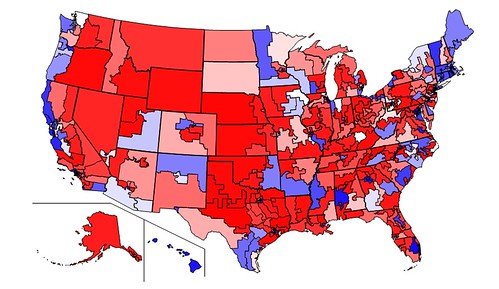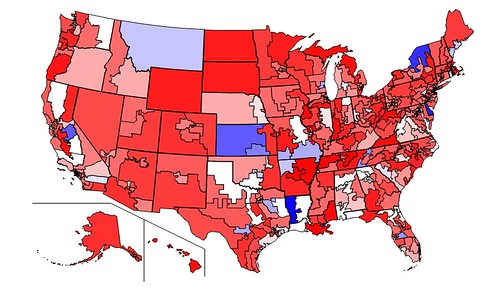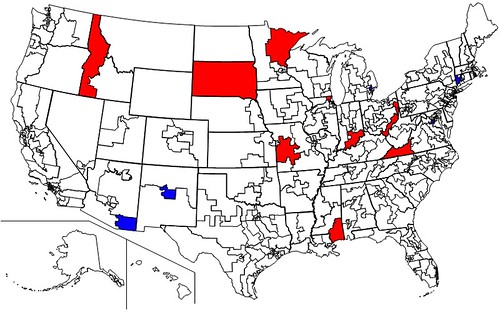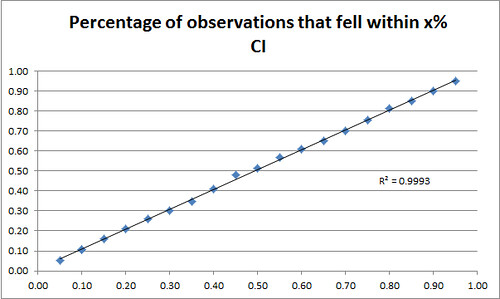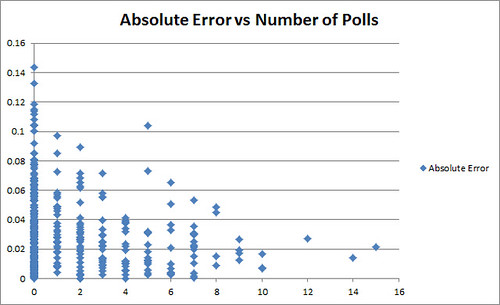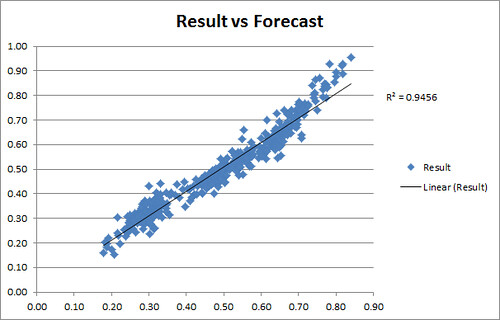It’s still the week of Election Day, which means it’s time to take an incredibly premature look at the Senate races developing in 2012. As you may have heard, the map favors the GOP, suggesting that the party may have their second big cycle in a row. However, theoretically, the Democrats had a favorable map in 2010 and they ended that without a single pick-up.
Instead of making predictions that are sure to be outdated in two months, let alone two years, I’m embracing the uncertainty. For each race, this preview will look at:
The best-case and worst-case scenario for the incumbent party; a rating on which scenario is more likely to happen (1 for worst-case, 10 for best-case)
Likely candidates, mostly made up of this year’s “Tommy Thompsons”. If you’ll recall, for most of 2009 and early 2010, pundits and observers thought the only way Russ Feingold would be in trouble is if Tommy Thompson ran. In nearly every state, there’s the “obvious” candidate(s) that conventional wisdom cements as the “only viable” candidate(s)-Schwarzenegger in California, Huckabee in Arkansas, Napolitano in Arizona, and these projections are more often wrong than right.
Retirement shock: every cycle features retirements, some expected and some unexpected. This looks at where such a retirement would fall. (1 for expected (like Bunning), 10 for completely shocking (like Bayh))
And for kicks and giggles, a “cattle call” to be preserved for posterity, so we can look at this diary 23 months from now and look at all the things we didn’t know would happen.
Democrats (and those who caucus):
California, Diane Feinstein
Best-case scenario: Given the lean of the state and disinterest among strong contenders, Feinstein fails to attract a major nominee and runs against a Dick Mountjoy-esque candidate.
Worst-case scenario: California’s budget woes only get worse under Gov. Brown, resulting in high dissatisfaction across the state; the GOP nominates a Hispanic candidate for President or Vice-President while other Hispanic national stars become more prominent, stopping or even reversing the hold Democrats have on the Hispanic vote; Obama’s victory in California is secured while he is mired campaigning full-time in a dozen battleground states away from the Pacific West, so he spends little time getting out the vote. Feinstein loses in a squeaker to a moderate, governance-minded Republican.
Scenario rating: 6 out of 10; Feinstein will probably pick up a more serious challenger, but have little problem defending her seat.
Possible candidates: Tom Campbell, Steve Poizner, Steve Cooley
Retirement shock: 5 out of 10; At age 77, she’s far from “old” for the Senate, and she stated she’s running again at a recent Boxer rally.
Race rating: DEM Favored
Connecticut, Joe Lieberman
Best-case scenario: Lieberman retires or runs and is easily defeated in the primary.
Worst-case scenario: Lieberman defects and runs as a Republican, or Lieberman runs third-party and who knows what happens.
Scenario rating: ??? out of 10; who knows?
Possible candidates: Chris Murphy, Joe Courtney, Ned Lamont, Sam Caliguiri, Tom Foley, Rob Simmons
Retirement shock: 3 out of 10; it wouldn’t shock anyone, but it’s not expected.
Race rating: Lean DEM
Delaware, Tom Carper
Best-case scenario: With no bench and Carper’s decision to run again, the GOP leaves the race unchallenged, or worse, nominates Christine O’Donnell.
ALTERNATIVE: Carper retires and Beau Biden decides to run for the seat.
Worst-case scenario: Carper decides to retire, and Mike Castle decides to run; having learned their lesson last time, he is unchallenged for the nomination.
Scenario rating: 8 out of 10; I think a Carper-Biden swap is likely, and the reason why Biden didn’t run in 2010.
Possible candidates: Beau Biden, Mike Castle, Christine O’Donnell, Michele Rollins
Retirement shock: 2 out of 10; Carper has repeatedly denied health issues but has had a long and successful political career. At age 63, he could easily run again but his retirement likely wouldn’t catch anyone off guard.
Race rating: Safe DEM
Florida, Bill Nelson
Best-case scenario: Rick Scott implodes as a Governor; Obama makes a major push to win Florida again; the GOP nomination is beset with infighting and a far-right and battle-fatigued candidate emerges from the scrum.
Worst-case scenario: The GOP nominates a solid candidate that keeps the party unified; the economy stays in similar shape; Marco Rubio is on the 2012 ticket or otherwise barnstorms around the state with his arm around the shoulder of the GOP nominee.
Scenario rating: 3 out of 10; Nelson will be a big target, and Crist’s defection left the state GOP remarkably solidified. There are a number of GOPers on the bench that could make this a marquee race.
Possible candidates: George LeMiuex, Jeb Bush, Connie Mack IV
Retirement shock: 8 out of 10
Race rating: Toss-up
Daniel Akaka, Hawaii
Best-case scenario: Akaka runs for re-election and Linda Lingle, Duke Aiona, and Charles Djou pass on the race.
Worst-case scenario: Akaka doesn’t run for re-election and Linda Lingle, Duke Aiona, or Charles Djou runs.
Scenario rating: 4 out of 10; Akaka says he’s “definitely running again”, but either way I think one of those three runs. Half of either scenario coming true would make this a 5 out of 10, but since I think Akaka’s retirement is moderately possible, I’ll downgrade it to 4.
Possible candidates: Linda Lingle, Duke Aiona, Charles Djou, Ed Case, Mufi Hannemann
Retirement shock: 4 out of 10
Race rating: DEM Favored
Ben Cardin, Maryland
Best-case scenario: Cardin is ignored in his bid for a second term.
Worst-case scenario: Some scandal tars the entire state party and Bob Ehrlich runs.
Scenario rating: 10 out of 10; Ehrlich has said he’s done with elections and Michael Steele is running for RNC Chairman again.
Possible candidates: Mary Kane
Retirement shock: 10 out of 10; Cardin is a freshman and will likely hold the seat as long as he wants.
Race rating: Safe DEM
Debbie Stabenow, Michigan
Best-case scenario: A brutal GOP primary made up of lackluster candidates produces a far-right but unqualified nominee.
Worst-case scenario: A pragmatic-minded GOP candidate gets the party unified behind him/her and runs a solid campaign against Stabenow.
Scenario rating: 3 out of 10; There’s always the potential for a sideshow, but Rick Snyder’s nomination and landslide victory provides a good template for the state GOP to use. If the party gets its act together, Stabenow will be in real trouble.
Possible candidates: John Engler, Terri Lynn Land, Candice Miller, David Camp, Mike Cox
Retirement shock: 6 out of 10; it’s not particularly likely, but given the turmoil in the Michigan Democratic Party, not that many people would be searching for a reason why.
Race rating: Toss-up
Minnesota, Amy Klobuchar
Best-case scenario: Most interested parties pass on the race, preferring to take on Franken in 2014 when Obama won’t be on the ticket, and Klobuchar is given a free pass against a minor nominee.
Worst-case scenario: She attracts a major challenger.
Scenario rating: 7 out of 10; we’re now looking at the personal whims of a handful of candidates who could theoretically make this a race, but it just seems unlikely that the GOP will be playing significant offense here.
Possible candidates: Norm Coleman, Tom Emmer, Jim Ramstad, Erik Paulsen, Paul Koering, Steve Sviggum
Retirement shock: 10 out of 10
Race rating: DEM Favored
Missouri, Claire McCaskill
Best-case scenario: A Tea Party candidate emerges from the primary on a far-right platform.
Worst-case scenario: The GOP primary unifies behind a solid nominee.
Scenario rating: 2 out of 10; while anything can happen in a primary, the Missouri GOP seems to be able to keep things under control. This is going to be one of the top targets for the GOP, and they’ll do anything they can to keep it that way.
Possible candidates: Jim Talent, Sarah Steelman, Jo Ann Emerson, Sam Graves
Retirement shock: 9 out of 10
Race rating: Toss-up
Montana, Jon Tester
Best-case scenario: The big name candidates decide to run for the open Governor’s seat instead of challenging him.
Worst-case scenario: The best-case scenario doesn’t happen.
Scenario rating: 2 out of 10
Possible candidates: Denny Rehberg, Marc Racicot
Retirement shock: 9 out of 10
Race rating: Toss-up
Ben Nelson, Nebraska
Best-case scenario: The big names pass on the race and Nelson faces another underwhelming or unknown opponent.
Worst-case scenario: Dave Heineman enters the race and clears the primary field.
Best-case scenario (for Nelson, not Democrats): Nelson agrees to a deal where he switches parties in exchange for not being primaried.
Scenario rating: 2 out of 10; even if Heineman decides not to run, there are still others who would make this a competitive race.
Possible candidates: Dave Heineman, Jon Bruning, Jeff Fortenberry, Lee Terry, Adrian Smith
Retirement shock: 6 out of 10; Nelson seems to be committed to the idea of running again, which is good because Democrats really don’t have that many other options here.
Race rating: Lean GOP
New Jersey, Bob Menendez
Best-case scenario: The state unifies behind a weak nominee or several big names pass on the race, leaving perhaps an underfunded and too conservative candidate.
Worst-case scenario: A strong and pragmatic nominee emerges with the support of Chris Christie, who receives a spike in approval ratings.
Scenario rating: 5 out of 10; this is a purely candidate-driven race. In a state like Jersey, the Democrats have the advantage.
Possible candidates: John Crowley, Tom Kean Jr., Steve Lonegan
Retirement shock: 10 out of 10
Race rating: Lean DEM
Jeff Bingaman, New Mexico
Best-case scenario: No real challenger emerges and Bingaman coasts to another election.
Worst-case scenario: Bingaman retires and Democrats are left unprepared.
Scenario rating: 9 out of 10.
Possible candidates: Heather Wilson, Pete Domenici Jr., Allen Weh
Retirement shock: 7 out of 10; Even though he’s a five-term Senator, Bingaman is only 67 years old.
Race rating: Safe DEM
New York, Kristen Gillibrand
Best-case scenario: Like in 2010, no big name rises to the occasion to challenge her.
Worst-case scenario: Gillibrand simultaneously receives a primary challenge that empties her bank account and leaves her scatched coming out of the September primary, while a strong GOP challenger awaits.
Scenario rating: 9 out of 10; 2010 was the time for either of those two things to happen.
Possible candidates: George Pataki, Rick Lazio
Retirement shock: 10 out of 10
Race rating: Safe DEM
North Dakota, Kent Conrad
Best-case scenario: Conrad runs again and with John Hoeven already in the Senate, there’s no one left to challenge him.
Worst-case scenario: Conrad retires.
Scenario rating: 7 out of 10; I don’t know what Conrad is going to do, but right now there’s no obvious reason why this would be a race.
Possible candidates: Rick Berg, Jack Dalrymple, Wayne Stenehjam
Retirement shock: 5 out of 10; after Dorgan’s retirement, I don’t think anyone would be shocked to death if this happened.
Race rating: Safe DEM
Ohio, Sherrod Brown
Best-case scenario: The GOP nominates a lackluster candidate while Obama’s ground-game massively turns out of the vote.
Worst-case scenario: The GOP nominates a solid candidate and Obama’s campaign team focuses on other battleground states.
Scenario rating: 5 out of 10; I think Obama will focus here, so it depends on who the nominee will be.
Possible candidates: Jim Jordan, Jon Husted, Mike DeWine, Mary Taylor
Retirement shock: 10 out of 10
Race rating: Toss-up
Pennsylvania, Bob Casey
Best-case scenario: Casey attracts only a minor candidate, or an otherwise roughed-up or far-right candidate.
Worst-case scenario: Casey attracts a solid candidate who runs with a unified party behind him/her.
Scenario rating: 5 out of 10; a lot could go wrong for either side here.
Possible candidates: Jim Gerlach, Rick Santorum
Retirement shock: 10 out of 10
Race rating: Toss-up
Rhode Island, Sheldon Whitehouse
Best-case scenario: Sheldon Whitehouse runs for re-election.
Worst-case scenario: Whitehouse is discovered to be a serial killer.
Scenario rating: 10 out of 10
Possible candidates: Don Carcieri, John Robitaille, John Loughlin
Retirement shock: 10 out of 10
Race rating: Safe DEM
Vermont, Bernie Sanders
Best-case scenario: Sanders runs for re-election.
Worst-case scenario: Vermonters suddenly decide they don’t like socialists.
Scenario rating: 10 out of 10
Possible candidates: Les Britton, Paul Beaudry, Brian Dubie, Jim Douglas
Retirement shock: 9 out of 10; Sanders is 69, but he’s also a freshman.
Race rating: Safe DEM
Virginia, Jim Webb
Best-case scenario: The Virginia GOP nominates someone from the far-right, like Del. Bob Marshall
Worst-case scenario: Webb declines to run again, catching the party off-guard, while the GOP nominates a solid candidate.
Scenario rating: 5 out of 10; a lot could go wrong here for both parties.
Possible candidates: George Allen, Bob Marshall, Corey Stewart, Ken Cuccinelli, Bill Bolling, Tom Davis, Rob Wittman
Retirement shock: 5 out of 10; Webb has been low-profile and all reports indicate he doesn’t enjoy life in the Senate.
Race rating: Toss-up
Washington, Maria Cantwell
Best-case scenario: Deflated from losing in 2010, the Washington GOP gives this race a pass while focusing on the Governor’s race instead.
Worst-case scenario: Cantwell attracts a strong challenger and is caught flat-footed in campaigning.
Scenario rating: 7 out of 10; I can see a decent challenger emerging, but Cantwell will probably be fine.
Possible candidates: Clint Didier, Don Benton, Dave Reichart, Cathy McMorris-Rodgers
Retirement shock: 8 out of 10
Race rating: Safe DEM
West Virginia, Joe Manchin
Best-case scenario: Manchin threads the needle of being a Washington D.C. Democratic incumbent with maintaining his popularity back home.
Worst-case scenario: Manchin is viewed as “going Washington” at the same time he’s down-ballot from Obama.
Scenario rating: 5 out of 10; it could really go either way here, however the GOP still needs a strong challenger.
Possible candidates: Shelley Moore Capito, Betty Ireland, David McKinley
Retirement shock: 10 out of 10
Race rating: Lean DEM
Wisconsin, Herb Kohl
Best-case scenario: Kohl runs for re-election.
Worst-case scenario: Kohl retires.
Scenario rating: 5 out of 10; I’ve heard both, but I’ve also heard of people preparing for Kohl to retire, so it looks like no one would be caught off guard.
Possible candidates: Ron Kind, Tom Barrett, Paul Ryan
Retirement shock: 2 out of 10
Race rating: Lean DEM
Republicans:
Arizona, Jon Kyl
Best-case scenario: No serious candidate emerges against Kyl
Worst-case scenario: A serious candidate emerges against Kyl
Scenario rating: 3 out of 10; how serious remains to be seen, but this looks to be near the top of a short list for Democrats.
Possible candidates: Gabrielle Giffords, Terry Goddard, Felicia Rotellini
Retirement shock: 8 out of 10
Race rating: Lean GOP
Indiana, Richard Lugar
Best-case scenario: Lugar runs for re-election and isn’t seriously challenged
Worst-case scenario: Lugar retires or is primaried by a far-right hardliner
Scenario rating: 6 out of 10; Lugar has announced for another term, but he’s near the top of the Tea Party hitlist. We’ll see who they come up with and if they follow through.
Possible candidates: Marlin Stutzman, Brad Ellsworth
Retirement shock: 4 out of 10; Lugar will be 80 in 2012.
Race rating: GOP Favored
Maine, Olympia Snowe
Best-case scenario: Snowe isn’t primaried.
Worst-case scenario: Snowe is primaried.
Scenario rating: 5 out of 10; if Snowe is the nominee, she’ll coast to victory as she always has and always will. If the Tea Party is stupid enough to challenge her and wins, they’ll have given Democrats another seat for free.
Possible candidates: Chandler Woodcock, Elias Cutler, Tom Allen
Retirement shock: 8 out of 10
Race rating: GOP Favored
Massachusetts, Scott Brown
Best-case scenario: Martha Coakley runs again.
Worst-case scenario: Democrats put forward a strong nominee while Scott Brown has to fight to get out of the primary, if he’s even able to.
Scenario rating: 3 out of 10; I see Brown getting re-nominated pretty easily, but he’ll have a tough challenger regardless.
Possible candidates: Mike Capuano, Joe Kennedy, Ted Kennedy Jr., Stephen Lynch, Ed Markey, Marty Meehan, John Tierney, Elizabeth Warren
Retirement shock: 10 out of 10
Race rating: Lean DEM
Mississippi, Roger Wicker
Best-case scenario: Wicker runs again.
Worst-case scenario: Some major skeleton is found in Wicker’s closet.
Scenario rating: 9 out of 10; there’s some talk of a primary challenge to Wicker, but it’s not clear who or if it would even matter.
Possible candidates: Travis Childers, Gene Taylor
Retirement shock: 10 out of 10
Race rating: Safe GOP
Nevada, John Ensign
Best-case scenario: Ensign retires or resigns quietly, the GOP nominates a solid alternative, and Democrats fail to capitalize on the situation.
Worst-case scenario: Ensign somehow wins the nomination or a far-right candidate wins; meanwhile more embarrassing stuff about Ensign comes out throughout the cycle.
Scenario rating: 5 out of 10; this state has been a constant headache for the GOP.
Possible candidates: Brian Krolicki, Dean Heller, Dana Titus, Rory Reid, Shelley Berkley, Oscar Goodman
Retirement shock: 2 out of 10; Ensign says he’s running but that may not hold up.
Race rating: Toss-up
Tennessee, Bob Corker
Best-case scenario: Corker is unchallenged in the primary and Democrats, still reeling from 2010, decline to pursue.
Worst-case scenario: Corker gets a primary challenge and Democrats nominate a solid candidate.
Scenario rating: 8 out of 10
Possible candidates: Steve Cohen, Phil Bredesen
Retirement shock: 10 out of 10
Race rating: Safe GOP
Texas, Kay Bailey Hutchison
Best-case scenario: Hutchison quietly retires and a strong GOP emerges from the primary, while Democrats pass on the race.
Worst-case scenario: GOP infighting produces a roughed-up nominee while the Democrats coalesce behind an up-and-comer.
Scenario rating: 5 out of 10; it could go either way.
Possible candidates: Michael Williams, Roger Williams, Elizabeth Jones, David Dewhurst, Tom Leppert, Bill White, John Sharp, Chet Edwards
Retirement shock: 1 out of 10; it’ll be a shock if she runs again.
Race rating: Lean GOP
Utah, Orrin Hatch
Best-case scenario: Whether Hatch is primaried or not, the GOP puts up a candidate for the race.
Worst-case scenario: Republicans nominate someone extremely radical while Jim Matheson runs for the Democrats.
Scenario rating: 1 out of 10
Possible candidates: Jason Chaffetz
Retirement shock: 4 out of 10; whether a retirement is forced or not, Hatch’s departure wouldn’t shock anyone.
Race rating: Safe GOP
Wyoming, John Barrasso
Best-case scenario: Barrasso runs again, or doesn’t.
Worst-case scenario: In the greatest paperwork snafu of history, Republicans accidentally forget to file and are without a nominee.
Scenario rating: 1 out of 10
Possible candidates: Gary Trauner
Retirement shock: 10 out of 10
Race rating: Safe GOP
Summary:
Anything could happen. Everyone learned that lesson coming into the 2010 cycle. However, it strains the imagination to come up with a scenario where Mississippi, Tennessee, Utah, or Wyoming become winnable for Democrats, and states like Indiana and Maine would require a series of events to come onto the map. The only targets otherwise are Arizona, Massachusetts, Nevada, and Texas; as far as maps go, that’s pretty favorable for Republicans.
Meanwhile, it all depends on candidate recruitment, but assuming no real failures (like FL-2006 or DE-2010), Florida, Michigan, Missouri, Montana, Nebraska, Ohio, Pennsylvania, and Virginia are top targets immediately. Developments could put Minnesota, New Jersey, North Dakota, West Virginia, and Wisconsin on the map, while California, Hawaii, and Washington remain long-shots.
Putting even the fringiest of races on the table, Republicans have 6 targets to defend to the Democrats 12-15. Looking at likely targets, its 4 to 8. It’s possible, like 2010 for the GOP, those 8 races all break for the incumbents while the 4 races stay as targets and others come onto the map. However, even if the 2012 cycle was a neutral cycle, this would still favor Republicans.
Now we just have to sit back, wait for retirements to come in, see if any unexpected appointments or tragic passing put another race on the map, and watch as our best combined conventional wisdom falls apart in front of our eyes.
Here’s my initial 2012 cattle call. What’s yours?
1. Nebraska (D)
2. Massachusetts (R)
3. Montana (D)
4. Virginia (D)
5. Missouri (D)
6. Nevada (R)
7. Florida (D)
8. Michigan (D)
9. Ohio (D)
10. Pennsylvania (D)
11. Arizona (R)
12. West Virginia (D)
13. Texas (R)
14. Wisconsin (D)
15. New Jersey (D)
16. Indiana (R)
17. Connecticut (D/I)
18. North Dakota (D)
19. Minnesota (D)
20. Washington (D)
21. Maine(R)
22. Hawaii (D)
23. California (D)
24. Tennessee (R)
25. Delaware (D)
26. New Mexico (D)
27. New York (D)
28. Mississippi (R)
29. Maryland (D)
30. Utah (R)
31. Vermont (D/I)
32. Rhode Island (D)
33. Wyoming (R)

